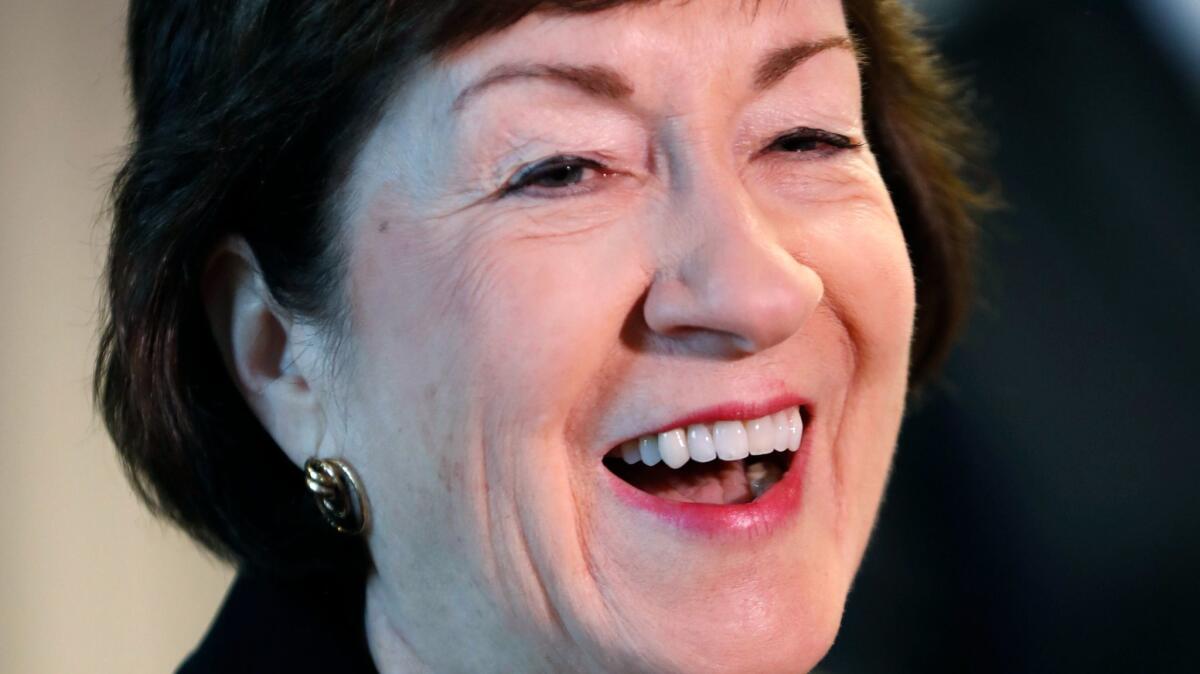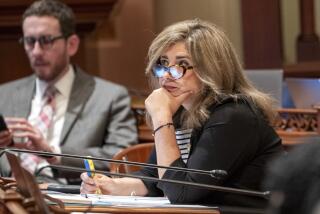Susan Collins announces she will stay in the Senate rather than seek Maineâs governorship

Reporting from Washington â Maine Sen. Susan Collins, one of the key Republican votes that blocked the partyâs effort to repeal Obamacare, announced Friday that she will forgo a race for the stateâs governorship, remaining in the Senate at least until her term expires in 2020.
âI am a congenital optimist and I continue to believe that Congress can and will be more productive,â Collins told an audience in Rockport, Maine, at the end of a speech on healthcare reform.
âI want to continue to play a key role in advancing policies that strengthen our nation, help our hardworking families, improve our healthcare system and bring peace and stability to a troubled and violent world, and I have concluded that the best way I can contribute to these priorities is to remain as a member of the United States Senate.â
Collins, who was reelected in 2014, indicated for months that she was conflicted about the decision. She won her Senate seat for the first time in 1996, two years after she lost an earlier race for governor. The winner was independent Angus King, who since 2013 has served with Collins in the Senate.
Collins sharply criticized both the partisan passage of the Affordable Care Act, or Obamacare, and the recent Republican efforts to repeal it.
âWe need to understand the consequences of what weâre doing, not vote on bills in the middle of the night that have had no substantial hearings and little analysis,â she said. âWe must work together across party lines to develop healthcare reform and we must stop allowing partisanship to be a preexisting condition that prevents meaningful health reform.â
Collins was one of three Republicans to vote against the final GOP healthcare bill voted on by the Senate, alongside Sen. Lisa Murkowski of Alaska and Sen. John McCain of Arizona. Among the problems Collins cited was its impact on women, because the measure would have stripped funding from Planned Parenthood.
âThis is about interfering with the ability of a woman to choose the healthcare provider who is right for her,â she said then. âThis harmful provision should have no place in legislation that purports to be about restoring patient choices and freedom.â
When Republicans tried to push through a second measure, the Graham-Cassidy bill, she objected to that as well on the grounds that it would have allowed states âto weaken protections for people with preexisting conditions, such as asthma, cancer, heart disease, arthritis and diabetes.â
Collins had been openly ambivalent about the governorâs race for months.
âSo Iâm trying to figure out where I can do the most good. Iâm being totally honest with you â I truly donât know, I really donât, itâs a hard decision,â she said during an April radio interview.
Collins had planned to announce her decision earlier, but told reporters in Maine that the healthcare votes delayed her time frame.
Twitter: @cathleendecker
ALSO
White House Chief of Staff John Kelly says heâs neither quitting nor getting fired
Trump plans to halt subsidies to health insurers, further undermining Obamacare
More to Read
Get the L.A. Times Politics newsletter
Deeply reported insights into legislation, politics and policy from Sacramento, Washington and beyond. In your inbox three times per week.
You may occasionally receive promotional content from the Los Angeles Times.











